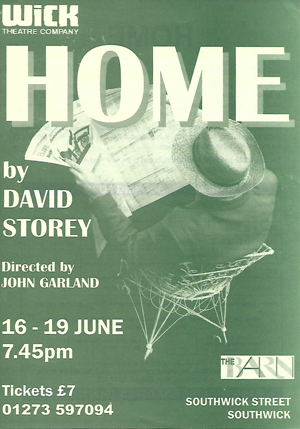John Garland wrote in the programme; “When I was asked to direct this play, I thought it might be a little too close to home for me to be objective. However, throughout the rehearsal period, I have become aware of the hidden depths of the piece and the wonderful writing style of the author. The five residents that we meet may not have anything particularly original to say but the poignancy of their situation, and the strategies that they employ to cope with it, gives a fascinating snapshot of their lives. For this I am very grateful to my cast who have worked extremely hard to master the text and get under the skins of the characters. Much rehearsal time has been spent exploring what makes the tick and I hope this shows in the end result.
The days of large scale institutions have now passed, but we should remember that the original purpose was to provide a place of safety for those too vulnerable to live in the outside world. Although I staunchly advocate the benefits of community care, I feel we should never forget the generation of people for whom the asylum really did become a “Home”.
Review #1: Home
Publication: Shoreham Herald
Publication Data: Unknown
Reviewer: Jamie Hailstone
Text Header: Unknown
Text: Content
Arriving in my usual state of ignorance, I knew nothing of the plot and was confronted with two seemingly affluent gentlemen in slacks and blazers on a garden terrace. They appear casual or new acquaintances and are swapping inconsequential anecdotes. The setting could be a bowls club or a hotel in Worthing but something seems not quite right. Slowly the penny dropped in what I fear is the world’s dimmest jukebox. The men are in an asylum. This is a sombre piece dealing with the debilitating effects of mental illness and the indignities suffered by many in the large-scale institutions of the 1960’s.
The scope is one day in the lives of five residents, during which their shattered expectations are laid bare within the rubric of their existence, which is the meal schedule. The actors speak almost entirely in platitudes and the script gives them little but hazy, circuitous reminiscences or non sequiturs. All five performers were outstanding but, as Jack, David Goodger excelled. Goodger’s inept, infantile version of the three-card trick underlined wonderfully that the character had largely regressed into childhood. As Harry, Derek Fraser was all subtlety and nuance when dredging up a little gallantry to lavish on would-be suicide Kathleen [Rosemary Mose], whose loud, open-legged vulgarity underlined the extreme fragility of her two male companions.
However sombre the theme, there were moments of high comedy, such as Kathleen’s suggestion that married couples should meet only once a fortnight: “It’s ridiculous living together – not human!” John Garland’s direction was crisp and uncluttered, while he was suitably manic in the minor rôle of the lobotomised Alfred. Garland chose to place the action on the floor and in the round, so heightening the intensity and immediacy. The effect was engrossing and often disturbing as the audience was only feet away from actors who were weeping copiously and exploiting alarming physical tics.
Home is an unforgiving, dense piece of writing which can easily become turgid if not handled deftly. But given Wick’s strength in depth and the resources of its principal actors, the group is justifiably fearless in what it takes on.
This piece was exquisite.
Review #2: Home
Publication: Brighton Argus
Publication Data: Unknown
Reviewer: Barrie Jerram
Text Header:
Text: Content
I have to confess that I was not particularly looking forward to seeing this play. It was one that I had not seen before but was aware that it was in the mould of a Pinter play – a playwright I find irritating. However, despite my prejudice, I found the production an enjoyable one that engaged my interest throughout.
Set in a sunlit garden two elderly men meet up, exchange pleasantries and reminisce about their pasts. But all is not what it seems. The men seem to be living in a Pinteresque world of non sequiturs and unfinished sentences where one wonders if their anecdotes real or are they fantasies? Jack is full of tales involving a large number of relatives, whilst Harry seems to have a pathetic need to either match or outdo some of Jack’s claims. They have a courteous and old-fashioned air about them and their peaceful world is soon disrupted by the arrival of two raucous women whose conversation is laden with sexual innuendoes. The mystery of the world inhabited by these four people is soon revealed. They are in fact residents of a large-scale mental institution and we are given an insight into their lives. Although the play is full of humour, there are many moments of sadness when the poignancy of their situation breaks through. Although they all talk of going home, the asylum has in fact become their home.
This difficult play was well handled by a strong cast with an extraordinary performance from David Goodger as Jack. His subtle body movements and facial expressions fully conveyed the confused and vulnerable personality of the character. His head forever darting forward and peering as though doing a double-take, whilst his face often collapsed into a wistful bafflement as words failed to come out mid-sentence. Of the two men his was the better-written part with plenty of opportunities to shine. As Harry, Derek Fraser, had the more difficult task. He was required to be more introspective with dialogue that often was fragmented or just one word. Likewise with the two female characters, Rosemary Mose had the meatier rôle as the sex-obsessed Kathleen and fully extracted the comedy as well as the pathos from the part. Joan Bearman conveyed well the dual nature of Marjorie – prudishly reproaching her friend’s sexual behaviour one moment and encouraging her the next.
The play was skillfully directed by John Garland, who brought out the best from his cast. In addition he played the small rôle of Alfred, another of the inmates.
Review #3: Home
Publication: Words & Music
Publication Data: No. 112 – September/October 2004 issue – page 12
Reviewer: Gordon Bull
Text: Content
This play presented a very different challenge to one’s senses. Five residents are confined to a home to see their days out. Whether due to ‘anno domini’ or for medical reasons we don’t need to know. It is the actors who have to meet the real challenge in a two-act play based entirely on virtually unrelated platitudinous dialogue and aimless movement during which the small cast have to engage the audience successfully against all the odds. This they were able to do with one caveat.
The second act was rather too similar to the first to be worth the effort. The sheer concentration required to fill in the gaps between the attenuated clichéd exchanges became very trying a second time round although it brought home to one the continuous stream of trite trivia we all spill out in our daily lives. [‘Well … right … you know. I hear you … know what I mean … you know… innit … they’re all the same … you should ’ear ’em … you could write a play. So there!] David Goodger as Jack and Derek Fraser as Harry carried us effectively, if a little stilted to start with.
Sidekick Rosemary Mose [Kathleen] with unconcealed underwear added a necessary lighter touch and kept us amused as did Joan Bearman [Marjorie] who tried to keep her respectable, while the men didn’t quite know where to look!
John Garland had the tricky task of directing while being a complementary fifth member of the cast.
[/showhide]





